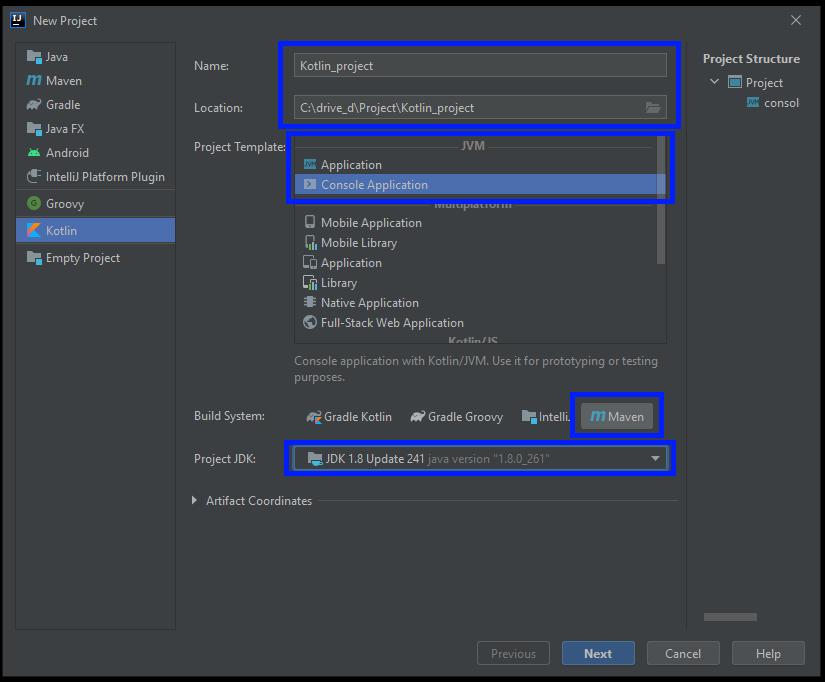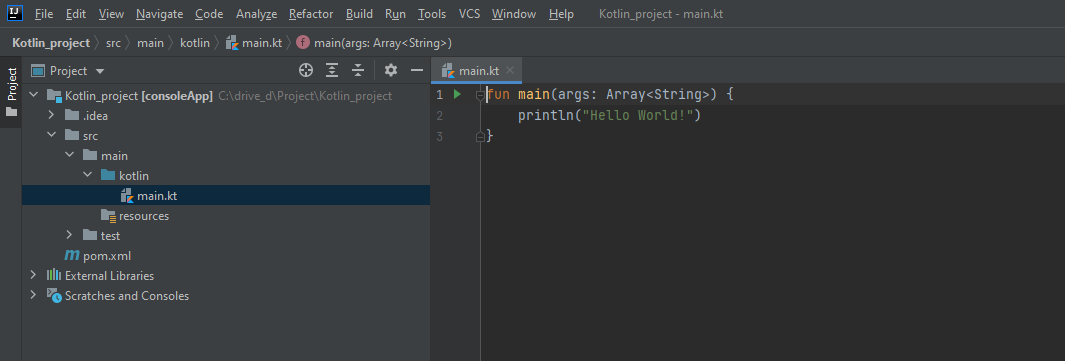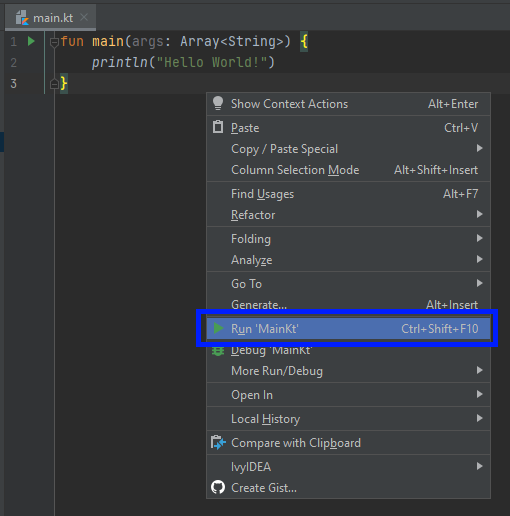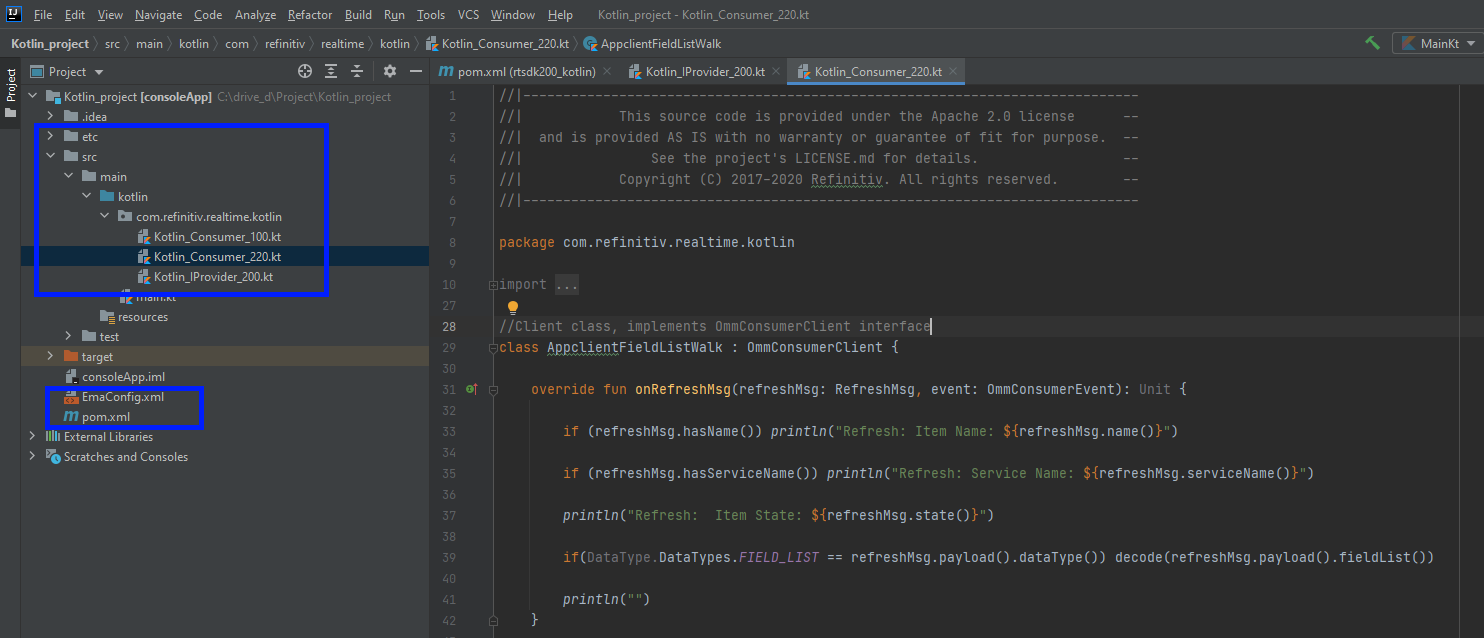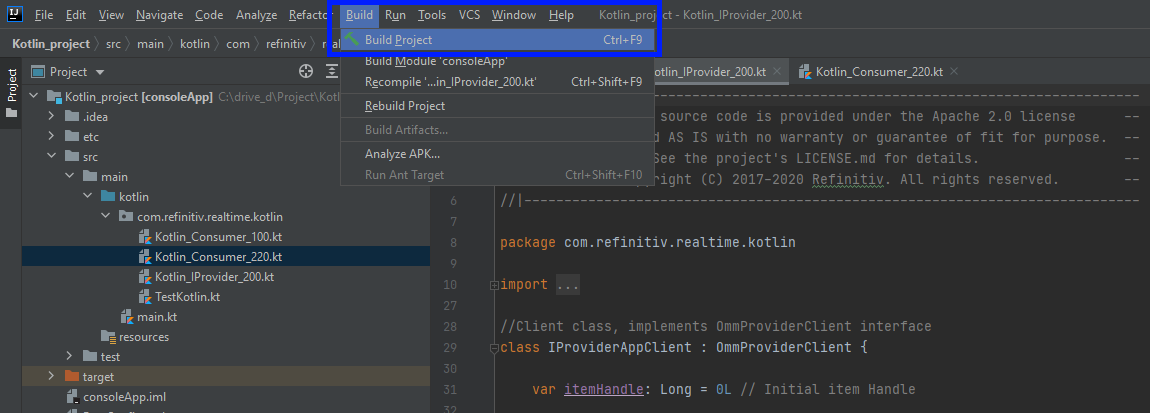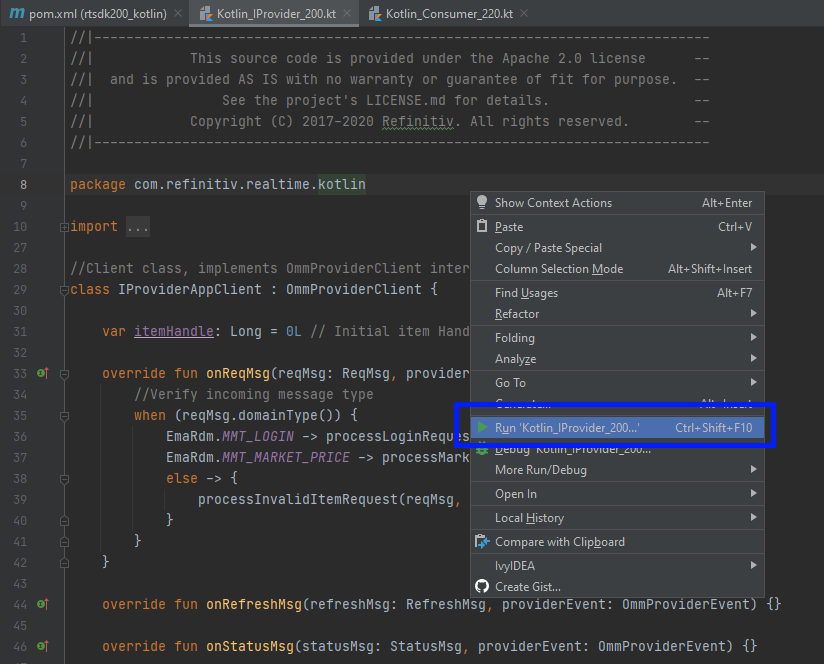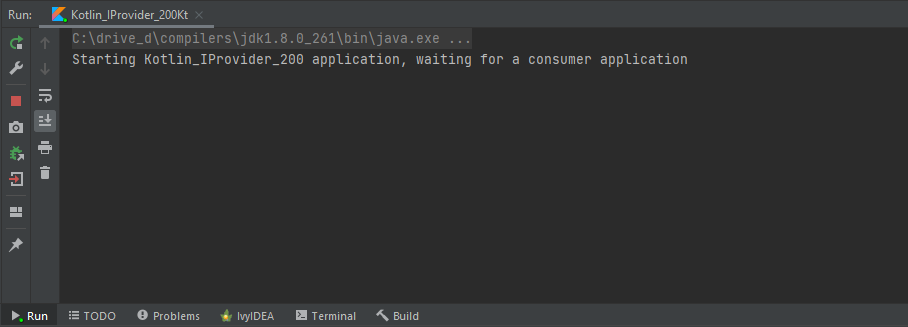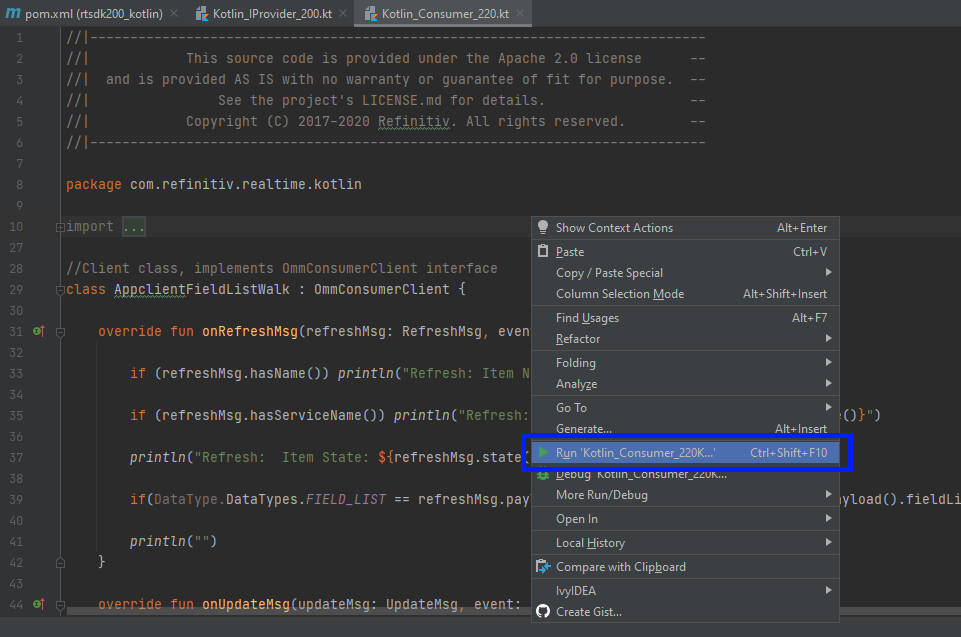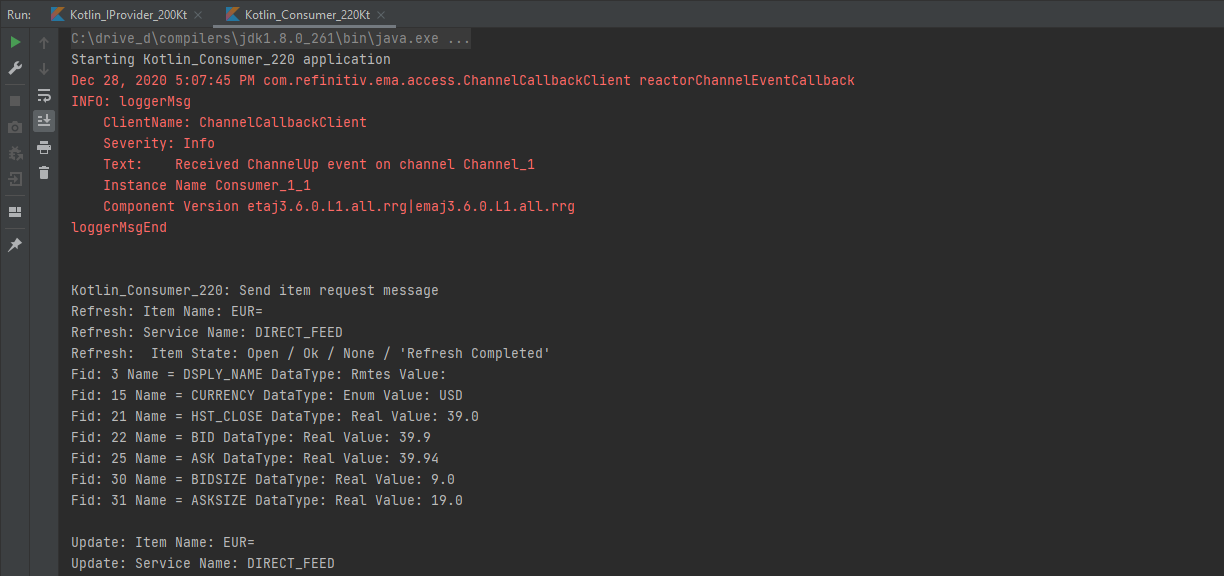
Overview
Update: September 2021
The Enterprise Message API Java (EMA Java) (formerly known as Elektron Message API) is a data-neutral, multi-threaded, ease-of-use API providing access to OMM and RWF data. As part of the Refinitiv Real-Time Software Development Kit, or RTSDK, the Enterprise Message API allows applications to consume and provide OMM data at the message level of the API stack. The message level is set on top of the transport level which is handled by the Enterprise Transport API (ETA API, formerly known as UPA API).
IMPORTANT Rebranding Announcement:
Starting with version RTSDK 2.0.0.L1 (same as EMA/ETA 3.6.0.L1), there are namespace changes and library name changes. Please note that all interfaces remain the same as prior releases of RTSDK and Elektron SDK and will remain fully wire compatible. Along with RTSDK 2.X version, a REBRAND.md is published to detail impact to existing applications and how to quickly adapt to the re-branded libraries. Existing applications will continue to work indefinitely as-is. Applications should be proactively rebranded to be able to utilize new features, security updates or fixes post 2.X release. Please see PCN for more details on support.
Kotlin Overview
Kotlin is a statically-typed programming language developed by Jetbrains that runs on the Java virtual machine. Kotlin is a first-class programming language on Android OS. Kotlin interpolates with Java code and is reliant on Java code from the existing Java Class Library/Framework. Kotlin syntax aims for reducing Java language verbosity and complexity. The language is also designed with Java Interoperability in mind. Existing Java code (and EMA Java libraries) can be naturally called from Kotlin.
This article shows how to implement the EMA Java OMM Consumer and OMM Provider applications with Kotlin programming language. The application source codes are implemented in Kotlin language with EMA Java library. All source code will be compiled to Java Virtual Machine (JVM) compatible Java classes and run in a console.
Note: Although Kotlin source code can also be compiled to JavaScript and Native code, this example project focus only on the JVM target environment.
Application files
The example project contains one Interactive-Provider application and two Consumer applications.
- The Kotlin_IProvider_200 shows how to implement a basic RSSL Interactive Provider application.
- The Kotlin_Consumer_100 shows how to implement a basic RSSL Consumer application.
- The Kotlin_Consumer_220 shows how to implement a RSSL Consumer application that handles incoming data for each FID type.
The consumer applications can consume data from Kotlin_IProvider_200 application or other Refinitiv Real-Time data sources (Refinitiv Real-Time Advanced Distribution Server, Refinitiv Real-Time Data Feed, etc).
You can find more detail regarding the OMM Consumer and OMM Interactive Provider interaction in EMA Java RDM Usage Guide sections 2.4 OMM Consumer / OMM Interactive Provider Initial Interaction and 2.5 Sending and Receiving Content. The EMA Java RDM Usage Guide is available on Refinitiv Real-Time SDK - Java: Documentation page.
The project includes completed Kotlin source codes, EMA Java Configurations file, and Maven POM file. You can download the latest version of RTSDK package from EMA Java: Download page or Maven Central Repository.
- src/main/kotlin folder: Applications source code folder
- Kotlin_Consumer_100.kt: A basic consumer application source code
- Kotlin_Consumer_220.kt: Consumer application source code that show how to handle incoming data
- Kotlin_IProvider_200.kt: Interactive Provider application source code
- pom.xml : Kotlin-RTSDK Maven's pom.xml file.
- etc/ folder: RTSDK Dictionary files folder (RDMFieldDictionary and enumtype.def files)
- EmaConfig.xml: RTSDK Java Configuration file
- LICENSE.md: License declaration file
- README.md: readme file
This example project and source code are compatible with Kotlin version 1.4.21, IntelliJ IDEA Java IDE versions 2020.3, and Refinitiv Real-Time SDK - Java edition 2.0.0 L1 (EMA Java 3.6.0 - Maven Central dependency: com.refinitiv.ema:ema:3.6.0.0).
Consumer Application Code Walkthrough
This article shows the Kotlin_Consumer_220.kt application code walkthrough. Please note that all Server, Data Dictionary, and Service name configurations are configured in EmaConfig.xml file.
Consumer Creation and Configuration
The Kotlin_Consumer_220.kt file implements the standard EMA Java Consumer applications. Firstly, we create OmmConsumer and OmmConsumerConfig objects. The OmmConsumerConfig object is configured to use "Consumer_1" configuration in the EmaConfig.xml file. The application then passes an OmmConsumerConfig object to an OmmConsumer object. By default, EMA will launch a background thread to manage communication and message dispatching when the application initiates an OmmConsumer object.
fun main(args: Array<String>) {
lateinit var consumer: OmmConsumer
try {
println("Starting Kotlin_Consumer_220 application")
//OmmConsumer, OmmConsumerConfig creation and establish communication.
consumer = EmaFactory.createOmmConsumer(EmaFactory.createOmmConsumerConfig().consumerName("Consumer_1"))
} catch (excp: InterruptedException) {
println(excp.message)
} catch (excp: OmmException) {
println(excp.message)
} finally {
consumer.uninitialize()
}
}
Create the Client application class
Next, we create the AppclientFieldListWalk class that implements the OmmConsumerClient interface. The AppclientFieldListWalk class defines a number of mandatory callback functions to capture the different events generated when the application registers interest in an item.
//Client class, implements OmmConsumerClient interface
class AppclientFieldListWalk : OmmConsumerClient {
override fun onRefreshMsg(refreshMsg: RefreshMsg, event: OmmConsumerEvent) {
println(refreshMsg)
}
override fun onUpdateMsg(updateMsg: UpdateMsg, event: OmmConsumerEvent) {
println(updateMsg)
}
override fun onStatusMsg(statusMsg: StatusMsg, event: OmmConsumerEvent) {
println(statusMsg)
}
override fun onGenericMsg(genericMsg: GenericMsg, event: OmmConsumerEvent): Unit {}
override fun onAckMsg(ackMsg: AckMsg, event: OmmConsumerEvent): Unit {}
override fun onAllMsg(msg: Msg, event: OmmConsumerEvent): Unit {}
}
Sending Market Price Item Request Message
Next, the application subscribes Euro currency Market Price data (EUR= RIC) to OMM Provider via the EMA Java OmmConsumer::registerClient() function. The application uses a default OmmConsumerConfig.OperationModel.API_DISPATCH dispatch model, so the application sleeps for one minute to lets the API dispatches all incoming messages to the AppclientFieldListWalk class.
fun main(args: Array<String>) {
lateinit var consumer: OmmConsumer
val appClient = AppclientFieldListWalk()
try {
println("Starting Kotlin_Consumer_220 application")
//OmmConsumer, OmmConsumerConfig creation and establish communication.
consumer = EmaFactory.createOmmConsumer(EmaFactory.createOmmConsumerConfig().consumerName("Consumer_1"))
println("Kotlin_Consumer_220: Send item request message")
consumer.registerClient(EmaFactory.createReqMsg().serviceName("DIRECT_FEED").name("EUR="), appClient) //Subscribe for EUR= RIC from DIRECT_FEED service
Thread.sleep(60000)
} catch (excp: InterruptedException) {
println(excp.message)
} catch (excp: OmmException) {
println(excp.message)
} finally {
consumer.uninitialize()
}
}
Handles incoming data
All messages (Refresh, Update, Status, etc) from the OMM Provider will be available via associate AppclientFieldListWalk callback functions. We implement a decode function to iterate each incoming OMM FieldList and FieldEntry data based on each field type, then parse and display it in a console. This function receives the FieldList data from Refresh and Update messages payload as a parameter.
class AppclientFieldListWalk : OmmConsumerClient {
//EMA callbacks functions
//Iterates OMM FieldList, then parse each OMM FieldEntry based on FID type
fun decode(fieldList: FieldList): Unit {
for (fieldEntry: FieldEntry in fieldList) {
print("Fid: ${fieldEntry.fieldId()} Name = ${fieldEntry.name()} DataType: ${DataType.asString(fieldEntry.load().dataType())} Value: ")
if (fieldEntry.code() == Data.DataCode.BLANK) {
println(" blank")
} else {
when (fieldEntry.loadType()) {
DataTypes.REAL -> println(fieldEntry.real().asDouble())
DataTypes.DATE -> println("${fieldEntry.date().day()} / ${fieldEntry.date().month()} / ${fieldEntry.date().year()}")
DataTypes.TIME -> println("${fieldEntry.time().hour()} : ${fieldEntry.time().minute()} : ${fieldEntry.time().second()} : ${fieldEntry.time().millisecond()}")
DataTypes.INT -> println(fieldEntry.intValue())
DataTypes.UINT -> println(fieldEntry.uintValue())
DataTypes.ASCII -> println(fieldEntry.ascii())
DataTypes.ENUM -> println("${if(fieldEntry.hasEnumDisplay()) fieldEntry.enumDisplay() else fieldEntry.enumValue() }")
DataTypes.RMTES -> println(fieldEntry.rmtes())
DataTypes.ERROR -> println("(${fieldEntry.error().errorCodeAsString()})")
else -> println("")
}
}
}
}
}
Next, we update onRefreshMsg() and onUpdateMsg() callback functions to send incoming FieldList payload data to parse and display in console via a decode() function.
class AppclientFieldListWalk : OmmConsumerClient {
override fun onRefreshMsg(refreshMsg: RefreshMsg, event: OmmConsumerEvent): Unit {
if (refreshMsg.hasName()) println("Refresh: Item Name: ${refreshMsg.name()}")
if (refreshMsg.hasServiceName()) println("Refresh: Service Name: ${refreshMsg.serviceName()}")
println("Refresh: Item State: ${refreshMsg.state()}")
if(DataType.DataTypes.FIELD_LIST == refreshMsg.payload().dataType()) decode(refreshMsg.payload().fieldList())
println("")
}
override fun onUpdateMsg(updateMsg: UpdateMsg, event: OmmConsumerEvent): Unit {
if (updateMsg.hasName()) println("Update: Item Name: ${updateMsg.name()}")
if (updateMsg.hasServiceName()) println("Update: Service Name: ${updateMsg.serviceName()}")
if(DataType.DataTypes.FIELD_LIST == updateMsg.payload().dataType()) decode(updateMsg.payload().fieldList())
println("")
}
override fun onStatusMsg(statusMsg: StatusMsg, event: OmmConsumerEvent): Unit {
if (statusMsg.hasName()) println("Status: Item Name: ${statusMsg.name()}")
if (statusMsg.hasServiceName()) println("Status: Service Name: ${statusMsg.serviceName()}")
if(statusMsg.hasState()) println("Status: Item State: ${statusMsg.state()}")
}
override fun onGenericMsg(genericMsg: GenericMsg, event: OmmConsumerEvent): Unit {}
override fun onAckMsg(ackMsg: AckMsg, event: OmmConsumerEvent): Unit {}
override fun onAllMsg(msg: Msg, event: OmmConsumerEvent): Unit {}
fun decode(fieldList: FieldList): Unit {
// Code from previous step
for (fieldEntry: FieldEntry in fieldList) {
//...
}
}
}
Now, Kotlin_Consumer_220.kt application is ready for connecting and consuming Market Price data from OMM Provider.
Interactive Provider Application Code Walkthrough
This section shows the Kotlin_IProvider_200.kt application code walkthrough. Please note that all Server, Data Dictionary, and Service name configurations are configured in EmaConfig.xml file.
Define the OmmProviderClient interface class
The Kotlin_IProvider_200.kt file implements the standard EMA Java Interactive Provider applications. Firstly, we create IProviderAppClient class that implements OmmProviderClient interface. This IProviderAppClient class will be responsible for the following tasks:
- Processing incoming Login/Market Price request messages from the consumer application.
- Sending Market Price Refresh message back to the consumer.
We define a number of mandatory OmmProviderClient's callback functions to handle different consumer request events.
//Client class, implements OmmProviderClient interface
class IProviderAppClient : OmmProviderClient {
override fun onReqMsg(reqMsg: ReqMsg, providerEvent: OmmProviderEvent) {}
override fun onRefreshMsg(refreshMsg: RefreshMsg, providerEvent: OmmProviderEvent) {}
override fun onStatusMsg(statusMsg: StatusMsg, providerEvent: OmmProviderEvent) {}
override fun onAllMsg(msg: Msg, providerEvent: OmmProviderEvent) {}
override fun onClose(closeMsg: ReqMsg, providerEvent: OmmProviderEvent) {}
override fun onGenericMsg(genericMsg: GenericMsg, providerEvent: OmmProviderEvent) {}
override fun onPostMsg(postMsg: PostMsg, providerEvent: OmmProviderEvent) {}
override fun onReissue(reissueMsg: ReqMsg, providerEvent: OmmProviderEvent) {}
}
fun main(args: Array<String>){
val appCient = IProviderAppClient()
}
Provider Creation and Configuration
Next we create OmmProvider object with EmaFactory.createOmmProvider() function and configure it to use "Provider_1" configuration in the EmaConfig.xml file. This Interactive Provider application uses a OmmConsumerConfig.OperationModel.USER_DISPATCH dispatch model, so application calls the OmmProvider.dispatch() function manually to dispatch received messages to IProviderAppClient class. By default, EMA will launch a background thread to manage communication and establishes a server port when the application initiates an OmmProvider object.
fun main(args: Array<String>){
lateinit var provider: OmmProvider
val appCient = IProviderAppClient()
try{
println("Starting Kotlin_IProvider_200 application, waiting for a consumer application")
//OMMProvider creation and establish sersver port.
provider = EmaFactory.createOmmProvider(EmaFactory.createOmmIProviderConfig().providerName("Provider_1").operationModel(OmmIProviderConfig.OperationModel.USER_DISPATCH), appCient)
while(appCient.itemHandle.toInt() == 0){
provider.dispatch(1000L)
Thread.sleep(1000L)
}
} catch (excp:OmmException ){
println(excp.message)
} catch (excp:InterruptedException ){
println(excp.message)
} finally {
/*provider?.let {
provider.uninitialize()
}*/
provider.uninitialize()
}
}
Handles incoming Login Request Message
All request messages from Consumer applications will be delivered to IProviderAppClient class via the onReqMsg() callback function. We check if the incoming request message domain type is a Login domain, then send that request message to the processLoginRequest() function for processing this Login request message. The processLoginRequest() function then sends a Login Refresh Response message via the OmmProvider.submit() function to accept this Login request.
class IProviderAppClient : OmmProviderClient {
var itemHandle: Long = 0L // Initial item Handle
override fun onReqMsg(reqMsg: ReqMsg, providerEvent: OmmProviderEvent) {
//Verify incoming message type
when (reqMsg.domainType()) {
EmaRdm.MMT_LOGIN -> processLoginRequest(reqMsg,providerEvent) //Handle Login Request Message
else -> {
println("Wrong Request")
}
}
}
//OmmProviderClient callbacks functions.
private fun processLoginRequest(reqMsg: ReqMsg, event: OmmProviderEvent) {
println("Receive Login Request message from ${reqMsg.name()}, send Login Refresh")
//Send Login REFESH_RESP message to consumer
event.provider().submit(
EmaFactory.createRefreshMsg()
.domainType(EmaRdm.MMT_LOGIN)
.name(reqMsg.name())
.nameType(EmaRdm.USER_NAME)
.complete(true)
.solicited(true)
.state(OmmState.StreamState.OPEN, OmmState.DataState.OK, OmmState.StatusCode.NONE, "Login accept")
.attrib(EmaFactory.createElementList())
, event.handle())
}
}
Handle incoming Market Price Request Message
Next, we update the onReqMsg callback function to support the Market Price request message. The application checks if the incoming request message domain type is a Market Price domain, then sends that request message to the processMarketPriceRequest() function for processing this Market Price request message.
The processMarketPriceRequest() function creates a Market Price Payload. Firstly, we create an OMM FieldList object via the EmaFactory.createFieldList() function, set each Field value and FID in an OMM FieldEntry object, add each FieldEntry object to FieldList object. Finally, the application sends a Market Price Refresh Response message with FieldList Payload to Consumer application via the OmmProvider.submit() function.
class IProviderAppClient : OmmProviderClient {
var itemHandle: Long = 0L // Initial item Handle
override fun onReqMsg(reqMsg: ReqMsg, providerEvent: OmmProviderEvent) {
//Verify incoming message type
when (reqMsg.domainType()) {
EmaRdm.MMT_LOGIN -> processLoginRequest(reqMsg,providerEvent) //Handle Login Request Message
EmaRdm.MMT_MARKET_PRICE -> processMarketPriceRequest(reqMsg,providerEvent) //Handle Market Request Message
else -> {
println("Wrong Request")
}
}
}
//OmmProviderClient callbacks functions.
fun processLoginRequest(reqMsg: ReqMsg, event: OmmProviderEvent) {
//Handle Login Request Message
}
private fun processMarketPriceRequest(reqMsg: ReqMsg,event: OmmProviderEvent){
println("Kotlin_IProvider_200: Receive Market Price Request message")
//Creates Market Price Payload and Send Refresh Message
val fieldList:FieldList = EmaFactory.createFieldList()
//Add each FID data to the message
fieldList.add(EmaFactory.createFieldEntry().ascii(3, reqMsg.name()))
fieldList.add(EmaFactory.createFieldEntry().enumValue(15, 840))
fieldList.add(EmaFactory.createFieldEntry().real(21, 3900, OmmReal.MagnitudeType.EXPONENT_NEG_2))
fieldList.add(EmaFactory.createFieldEntry().real(22, 3990, OmmReal.MagnitudeType.EXPONENT_NEG_2))
fieldList.add(EmaFactory.createFieldEntry().real(25, 3994, OmmReal.MagnitudeType.EXPONENT_NEG_2))
fieldList.add(EmaFactory.createFieldEntry().real(30, 9 , OmmReal.MagnitudeType.EXPONENT_0))
fieldList.add(EmaFactory.createFieldEntry().real(31, 19 , OmmReal.MagnitudeType.EXPONENT_0))
println("Kotlin_IProvider_200: Send Market Price Refresh message")
//Send Market Price REFESH_RESP message to consumer
event.provider().submit(
EmaFactory.createRefreshMsg()
.serviceName(reqMsg.serviceName())
.name(reqMsg.name())
.state(OmmState.StreamState.OPEN, OmmState.DataState.OK, OmmState.StatusCode.NONE , "Refresh Completed")
.solicited(true)
.payload(fieldList)
.complete(true)
, event.handle())
itemHandle = event.handle()
}
}
Sending Market Price Update Message
The application sends Market Price Update Messages to Consumer application in a main() function. Firstly, the application creates OMM FieldList and Update Message objects via the EmaFactory class. The application creates the Update Message Payload with OMM FieldList and OMM FieldEntry objects, and sends the Update Message object with a payload via the OmmProvider.submit() function.
We iterate integer value from 1 to 59 and adds that value to the Price value of each Update message payload. This behavior simulates Refinitiv Real-Time Update Message behavior in that each tick contains a different updated value.
fun main(args: Array<String>){
//OMMProvider creation and establish sersver port.
provider = EmaFactory.createOmmProvider(EmaFactory.createOmmIProviderConfig().providerName("Provider_1").operationModel(OmmIProviderConfig.OperationModel.USER_DISPATCH), appCient)
//Creats OMM FieldList and Update Message objects
val fieldList: FieldList = EmaFactory.createFieldList()
val updateMsg: UpdateMsg = EmaFactory.createUpdateMsg()
for(index in 1..59){
val startTime: Long = System.currentTimeMillis()
provider.dispatch(1000L)
//Add each FID data to the message
fieldList.clear()
fieldList.add(EmaFactory.createFieldEntry().real(22, 3991 + index.toLong(), OmmReal.MagnitudeType.EXPONENT_NEG_2))
fieldList.add(EmaFactory.createFieldEntry().real(25, 3994 + index.toLong(), OmmReal.MagnitudeType.EXPONENT_NEG_2))
fieldList.add(EmaFactory.createFieldEntry().real(30, 10 + index.toLong(), OmmReal.MagnitudeType.EXPONENT_0))
fieldList.add(EmaFactory.createFieldEntry().real(31, 19 + index.toLong(), OmmReal.MagnitudeType.EXPONENT_0))
//Send Market Price UPDATE_RESP message to consumer
provider.submit(updateMsg.clear().payload(fieldList), appCient.itemHandle)
println("Kotlin_IProvider_200: Send Market Price Update messages")
while(System.currentTimeMillis() - startTime < 1000){}
}
}
Handles Invalid Request Message
The application needs to handle invalid request messages from Consumer applications as well. We create a processInvalidItemRequest() function to send OMM Status message with Stream State: Closed, Data State: Suspect to Consumer application for following cases:
- Incoming request messages are not Login and Market Price domains
- An Item Handle is an invalid number.
class IProviderAppClient : OmmProviderClient {
var itemHandle: Long = 0L // Initial item Handle
override fun onReqMsg(reqMsg: ReqMsg, providerEvent: OmmProviderEvent) {
when (reqMsg.domainType()) {
EmaRdm.MMT_LOGIN -> processLoginRequest(reqMsg,providerEvent) //Handle Login Request Message
EmaRdm.MMT_MARKET_PRICE -> processMarketPriceRequest(reqMsg,providerEvent) //Handle Market Price Request Message
else -> {
processInvalidItemRequest(reqMsg,providerEvent)
}
}
}
//OmmProviderClient callbacks functions.
fun processLoginRequest(reqMsg: ReqMsg, event: OmmProviderEvent) {
//Handle Login Request Message
}
private fun processMarketPriceRequest(reqMsg: ReqMsg,event: OmmProviderEvent){
if(itemHandle.toInt() != 0){
processInvalidItemRequest(reqMsg,event)
return
}
//Creates Market Price Payload and Send Refresh Message
}
private fun processInvalidItemRequest(reqMsg: ReqMsg, event: OmmProviderEvent){
event.provider().submit(
EmaFactory.createStatusMsg()
.name(reqMsg.name())
.serviceName(reqMsg.serviceName())
.domainType(reqMsg.domainType())
.state(OmmState.StreamState.CLOSED, OmmState.DataState.SUSPECT, OmmState.StatusCode.NOT_FOUND, "Item not found")
, event.handle())
}
}
Now, Kotlin_Consumer_220.kt application is ready for publishing Market Price data for OMM Consumer.
Application Setup
The application source code and Intelli IDEA Community Edition project files are available on GitHub website. You can get it via the following git command.
$>git clone git@github.com:Refinitiv-API-Samples/Example.EMA.Java.Kotlin.git
This example requires the following dependencies software.
- Oracle Java 8 SDK.
- IntelliJ IDEA Java IDE version 2020.3 and above. You can download IntelliJ IDEA Community Edition from this page.
- Refinitiv Real-Time SDK (RTSDK) Java Libraries via Maven Central website. You can also download the SDK documents and examples from Refinitiv Real-Time SDK - Java: Download page or GitHub page.
- Apache Maven project management and comprehension tool.
- Internet connection.
please check the README.md in the source code project for more detail.
How to run this example with IntelliJ IDEA
1. Create a development directory of your choice (for example, C:\drive_d\Project\Kotlin_project).
2. Open IntelliJ IDEA Java IDE, select Create New Project.
3. Select Kotlin, Project Templates: JVM Console Application, Build System: Maven, and Project JDK. Finally, input your project folder location and project name
4. Leave everything as is and click the Finish button.
5. IntelliJ IDEA Java IDE automatically generates project Maven's pom.xml file, an example main.kt console application file in src/main/kotlin of the project folder.
6. The main.kt file is useful for verifying IntelliJ and Kotlin SDK/Runtime setup in the developers' environment. You can right-click on the main.kt file, then choose Run 'MainKt' menu to test running a console Kotlin application.
7. The result of main.kt file console application is the following:
8. Next, Unzip or download the example project folder and copy src, etc folders, EmaConfig.xml file, and pom.xml file (replacing existing pom.xml one that generated by the IDE) to the development directory (example, C:\drive_d\Project\Kotlin_project). The EMA-Kotiln example applications, etc folder, and EmaConfig.xml file will be available in IntelliJ IDEA.
9. You may need to open a newly replaced pom.xml file, and click the reload button to reload all Kotlin and RTSDK dependencies.
11. Open Kotlin_IProvider_200.kt file, right-click and choose Run to start the Kotlin_IProvider_200 provider application.
12. The Kotlin_IProvider_200 application will be started and waiting for a consumer application.
13. Open Kotlin_Consumer_220.kt file, right-click and choose Run to start the Kotlin_Consumer_220 consumer application.
14. The Kotlin_Consumer_220 application will be started, then connects and consumes data from Kotlin_IProvider_200 application.
If you prefer to build and run the project with a command line, please follow Build and run the Project with Apache Maven via a command line section in the project's README.md file.
Conclusion
Kotlin is now a rising star cross-platform, statically typed, general-purpose programming language. The language lets developers implement a concise and expressive code while maintaining full compatibility with Java.
This language simplicity helps developers write the Real-Time application using EMA/RTSDK in a simple way that simpler and smaller than implement EMA application on the native-Java.
References
For further details, please check out the following resources:
- Refinitiv Real-Time SDK Java page on the Refinitiv Developer Community web site.
- Kotlin programming language: Reference page.
- Kotlin programming language: Tutorials page.
- Enterprise Message API Java Quick Start
- Developer Webinar: Introduction to Enterprise App Creation With Open-Source Enterprise Message API
- Developer Article: 10 important things you need to know before you write an Enterprise Real Time application
For any questions related to this article or Enterprise Message API page, please use the Developer Community Q&A Forum.


